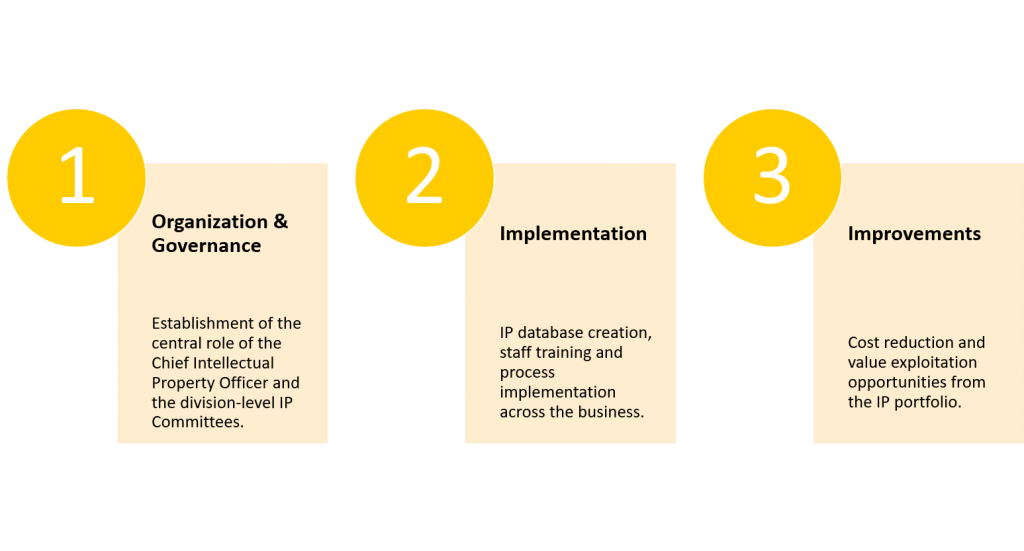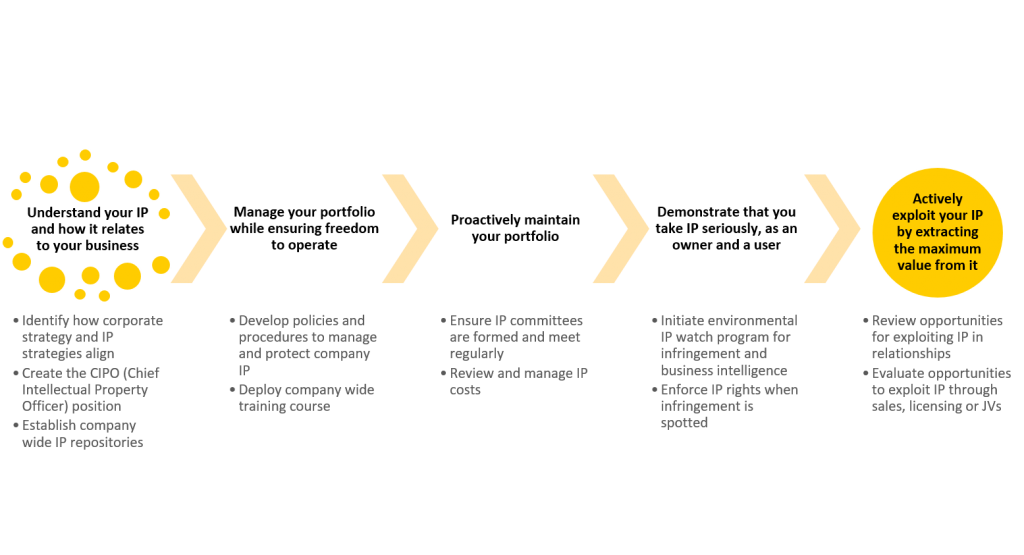
Intellectual Property (IP) is the most important assets that businesses have. IP codifies the expertise, skills and capability of a business; IP identifies the specific applications, technologies and products that the business creates. The ability to identify, manage and exploit IP is therefore a critical skill to acquire especially for technology-rich, product developers.
Key take away points…
- There is no such thing as IP Strategy – there is only Strategy
- IP is more than patents, and IP management is more than protecting value – it must also stop value leaking / leaving the business
- IP awareness across the business is essential. Like total quality management -> total IP awareness
What is Strategy?
Strategy is the selection (either deliberate or emergent, or semi-coherent) of a unique and valuable proposition rooted in the system of activities that is difficult for competitors to imitate [Porter].
The sustainability of such a strategy typically requires trade-offs among activities – strategy is dynamic and contextual (in the context of the resources available to the organisation and the external environment it finds itself in), and gives the organisation a “sense of direction”.
Porter argues that management across all of the activities enhances the competitive advantage and sustainability.
Strategy addresses questions such as:
- What is the relative potential of an organisation’s various business units and their relative potential as areas for future investment?
- How is the organisation to achieve necessary levels of economies of scale, or organisational learning, or technical innovation, sufficient to enable it to match or exceed the performance levels of rival organisations?
- Which of the organisation’s resources and capabilities are likely to need to change over time in line with changes in the marketplace or in technology?
- How are we to build and manage complex resource clusters?
- How do we monitor and revise our strategies so as to identify and respond to environmental turbulence?
- How do we determine the shape, size and purpose of our organisation over time? What changes in organisational structure and processes might be necessary?
- Which activities should our organisation continue to perform internally, and which should we rely on other organisations to contribute via outsourcing or co-operative alliances?
Operational thinking relates to those activities or sets of activities that characterise the internal functioning of an organisation on a day-to-day basis.
Strategic thinking, by contrast, considers the performance of such systems and activities in their entirety. It is a way of thinking that reflects on how all these activities connect and relate to each other in achieving the objectives or mission of the organisation. Strategic thinking asks not only how these activities work together, but also how they can be aligned, combined or performed differently to deliver a product or service of distinct value to the market. [Porter]
Strategy operates at different levels within the business. Porter further argues that operational effectiveness should be a given – it is necessary, but not sufficient. He also argues that management tools have taken the place of strategy as manager focus on continuous operational improvement – but that this misses the point.
A reliance on management tools (best practice methodologies promoted by management consultants) drives all businesses to become similar. This is no substitute for ‘deliberately choosing a set of activities to deliver a unique mix of value’.
Strategy without IP Strategy doesn’t make sense
Since strategy should be considered business wide – across all activities, it is essential that all functions within a business are aligned.
Therefore corporate strategy without IP strategy is like a thriller novel without the last chapter – all the other parts are present, but don’t make sense.
Corporate strategy with a boiler-plate approach to IP also risks a loss in sustainability – strategy should be holistic and tightly coupled across the business.
IP strategy needs to speak corporate language
One of the issues with “IP” is that it is still relatively uncommon for board members to be skilled in IP management. It is not uncommon for no-one on the board to really “get IP”.
There is a need for education, but also the IP industry needs to speak in terms that business understands – which drives action and change.
IP industry appears, from the outside, to be in the weeds of patent law and the latest US court cases.
We need to do more to promote the positive benefits of strong IP management within business.
Tools and frameworks aren’t‘ as mature as other functional areas of business
When looking at the literature, both academic and management theory, on strategy in general we can see a good solid body of work that provides tools, techniques and models for developing strategic thinking within the business.
What we don’t see is anything IP specific. There is a lack of academic literature on IP strategy – the why, what and how to build a coherent IP strategy for business.
Strategy is holistic, and as part of that IP strategy should also be holistic
Just as Total Quality Management started out as a function specific need to inspect and control the quality of products in manufacturing, but evolved to become an organisation wide culture, so to does IP need to break from been an IP department issues, or a management issue, to be one that all employees engage with, are educated in, and take responsibility for.
It is rare for businesses to identify a need for strategic IP advice as a matter of business-as-usual.
The typical touch point is “we are been sued by a competitor”, or “a patent owner is chasing us for licensing”.
As client of Cubicibuc’s recently expressed interest in discussing some IP Strategy support as “[We] are not great at managing IP” – there’s a lot to unpack in that…
Unpacking the touch points
- What do you mean when you say IP?
- Why do you think you aren’t good at managing IP?
- Do you have a view of your competitors that is different?
- What do you think you should be doing better?
- What does the board think?
IP Strategy is a necessary element to an organisation’s overall strategy. vital intelligence to:
- Share knowledge internally and externally across department and disciplines. In turn this leads to greater productivity, greater innovation and increased motivation
- Maximise the value of your investment in R&D and your IP assets. Make strategic decisions about which Intellectual Assets to protect, which to share and which to avoid
- Manage external relationships and contracts with more confidence. A knowledge of your IP provides leverage when negotiating contracts; a knowledge of your competitors’ IP gives you competitive business intelligence that informs business strategy
- Generate revenue by exploiting the value held in your IP through licensing or sale.
Embedding a robust and value-creating IP strategy
Boards should at least be able to clearly communicate answers to the following questions:
- How does our IP contribute to P&L?
- How does our IP strategy protect our position for today and tomorrow?
- Are we using IP to protect our investment in R&D and new product developments?
- Do we manage IP risk sufficiently well, and are we prepared to react to threats and opportunities?

Understanding your own IP and that of the main players in the landscape gives you valuable business intelligence to spot trends, to identify weaknesses and to build IP ahead of product roadmaps – maximising the value from your R&D.
The IP industry needs to develop toolkits for companies to deploy when building strategies. Longer term, we must support the education of business – at all levels to have a basic understanding of IP

Cubicibuc supports clients of all sizes in the identification and development of strategic plans for intellectual property. Our aim is to provide a link between the corporate goals and the operational function of IP.
For more information about how we can help, please get in touch.
